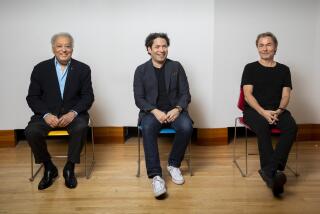Driven by distraction
- Share via
Andras Schiff, the Hungarian pianist, can be a magnificent Mozartean. His approach is Olympian. Sunday night at Walt Disney Concert Hall, he set out to hold up three sonatas, two rondos, a fantasy, an adagio and some variations to be examined for their perfection, as if they were three-dimensional objects to be appreciated from every angle in a pristine, white-glove environment.
Not a speck of dust would be allowed to mar their perfection. Emotional gravity would replace physical gravity, as music became all but weightless in pure, atomless space. The goal was levitation, not levity.
But what is the paradox about an irresistible force meeting an immovable object? I’ve never properly understood it, yet I suspect something like it occurred midway through the first half of Schiff’s recital during the deep, despairing B-minor Adagio. A late piece of mysterious origin, this was thought by the pioneering Mozart scholar Alfred Einstein to have simply “flowed from Mozart’s pen in an hour at once tragic and blessed.”
The circumstances Sunday were indeed tragic and blessed. The moon outside was half full and bright. The air, as it is at this time of the year, was dry, cough-producing. The stars must have been peculiarly aligned. Things started to happen.
Schiff played with extraordinary intensity. Rarely using the pedal, he produced a dry, clean tone, each note an essential, perfected sound that, when precisely placed, created a great monument. But the fragility of the balancing act meant it was best to hold one’s breath.
Instead, someone in the balcony dropped a cane, which clattered down the uncarpeted steps with impressive percussive presence, loudly rattling for what seemed an eternity. Visibly surprised, Schiff maintained his composure and continued. Then came the coughs. A woman in one of the terraces couldn’t control her outbursts and quickly tried to exit, heels loudly clicking, coughs continuing to be audible from outside the terrace.
This was too much for Schiff, who lost his concentration and walked offstage. After an announcement by Deborah Borda from the Los Angeles Philharmonic, which sponsored the recital, asking the audience to understand how difficult it is for an artist to be on a stage where the acoustics are just as good as everywhere else in the hall, Schiff returned, smiled shyly and resumed where he had left off.
Two seconds later, a cellphone rang. The audience groaned, and the phone was quickly silenced. Schiff was shaken, but he continued. And from then on, nothing was the same.
Noise, that irresistible force, made Mozart no longer an unchippable porcelain-perfect object but living, breathing (OK, coughing) music. Schiff’s concentration deepened. He attacked bass notes with greater emphasis. He was angry.
The recital had begun with the A-major Sonata, K. 331, and the “Turkish” finale was not much fun. The program then ventured into Mozart’s emotionally richest keyboard territory with the D-minor Fantasy, K. 397; the interrupted B-minor Adagio, K. 540; and the D-major Rondo, K. 485. Schiff’s intention was apparently to fashion a new ultra-intense sonata out of these three independent movements. Once the Adagio was broken, however, the whole pretense collapsed, and perhaps that was just as well. In the Sonata in A minor, K. 310, that followed, Schiff’s anger met Mozart’s anger, and it exploded.
After intermission, Schiff played brighter music -- the C-major Sonata, K. 545, known to every piano student, followed by the A-minor Rondo, K. 511, and the brilliant, bravura set of variations on Gluck’s “Unser dummer Pobel meint” -- in a room quiet enough to hear a pin drop. He played newly afire. He added colorful, charming decorations. He brought out amazing inner details. He made a mistake or two. He almost smiled, almost lost his aloofness, almost became one of us. It was the finest playing from him I’ve witnessed.
Mozart could be a master of surprise. Schiff can be a control freak, and surprise is the one thing his magnificent Mozart always lacked. Whoever dropped the cane, whoever coughed the coughs should be thanked. Because of them, an immovable object moved, and it was glorious.
*
More to Read
The biggest entertainment stories
Get our big stories about Hollywood, film, television, music, arts, culture and more right in your inbox as soon as they publish.
You may occasionally receive promotional content from the Los Angeles Times.











